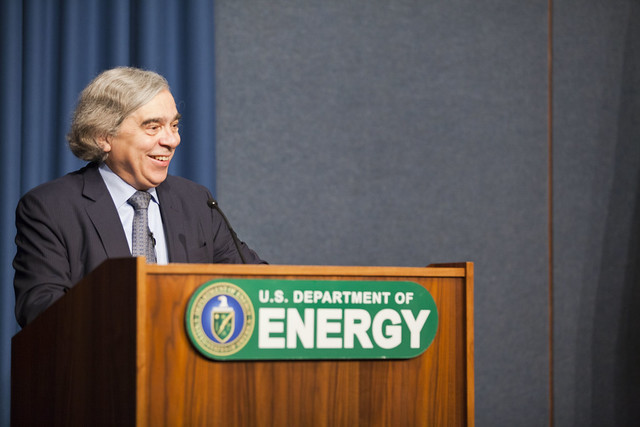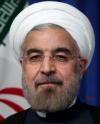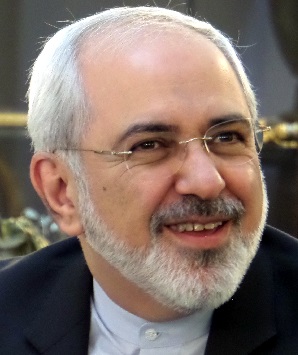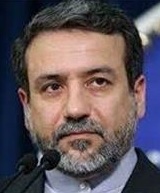On April 23, Iran and the world’s six major powers began three days of nuclear negotiations in Vienna. Negotiators are working to draft a final agreement by June 30, but disagreements remain about the timing of sanctions relief, Iran’s nuclear research and development, and the scope of international inspections. Secretary of State John Kerry and Iranian Foreign Minister Mohammad Javad Zarif met in New York on the sidelines of the 2015 Non-Proliferation of Nuclear Weapons Treaty conference on April 27. Kerry noted that the “hard work is far from over” but that negotiators are “closer than ever” to a final deal.
The following are excerpted remarks from officials on the status of the nuclear negotiations.
United States
Secretary of State John Kerry

“The United States and our P5+1 partners have come together with Iran around a series of parameters that, if finalized and implemented, will close off all of Iran’s possible pathways to the nuclear material required for a nuclear weapon, and give the international community the confidence that it needs to know that Iran’s nuclear program is indeed exclusively peaceful.
I want you to know the hard work is far from over and some key issues remain unresolved. But we are, in fact, closer than ever to the good comprehensive deal that we have been seeking. And if we can get there, the entire world will be safer.
Now it’s important to remember that the NPT has always been at the heart of these negotiations. From day one we have been focused on bringing Iran back into compliance with its obligations under the treaty. And if ultimately the talks are successful, it will once again prove the power of diplomacy over conflict and reinforce the rule of law.
Now we have said from the beginning that any deal with Iran will rely not on promises, not on words, but on proof. It will arrive – rely on verification, which is really at the center of the NPT and the entire IAEA process. Obviously verification is at the heart of the NPT, and one of the most important things that we can do to support our nonproliferation goals is to strengthen the IAEA safeguards in order to ensure that the agency has exactly what it needs in order to be able to verify safeguard agreements. That’s why the United States is working to bring the Additional Protocol into force globally and to make it the standard, the global standard for safeguards compliance.”
Energy Secretary Ernest Moniz

"For a considerable time period, 10 years at a minimum, we will have I would say a very comfortable ability to detect any military activity related to the nuclear program and we would have adequate time to respond. Then over time we still have very strong constraints going forward.”
"The idea is that in the very long term, Iran hopefully will perform, will prove that it's a peaceful program, but even then as we go to 25 years, we will have access in a completely unprecedented way to their uranium supply chain."
—April 23, 2015 according to the press
Undersecretary of State for Political Affairs Wendy Sherman
"We understand that Israel is in a tough neighborhood. That’s why we have given Israel more security assistance than any other Administration in history. And that’s why we’re doing everything we can to ensure that that neighborhood doesn’t become even tougher with a nuclear-armed Iran. We believe that the parameters, announced two weeks ago in Lausanne, offer the best chance at preventing Iran from obtaining a nuclear weapon, and just as importantly, that the alternatives fall far short of what we’ll have if we’re able to turn the political framework into a comprehensive agreement.
Without such an agreement, Iran’s breakout time to get enough nuclear material for a weapon is two or three months – what it is right now. With this agreement it will be one year, up to six times as long as it is now, for at least 10 years. Without this agreement, Iran would expand its enrichment program to 100,000 centrifuges in the next few years. With this agreement, we will have limited Iran to operating about 5,000 centrifuges for at least the next decade. Without this agreement, Iran could produce two weapons’ worth of weapons-grade plutonium every single year. With this agreement, Iran is going to have zero weapons-grade plutonium, and not just for 10 years, but for the lifetime of the reactor.
Without this agreement, Iran would be able to expand its stockpile of currently 10 tons of enriched uranium. With this agreement, that stockpile will be reduced by 98 percent to only three kilograms[1] of a working stockpile. And without this agreement, the international community through the International Atomic Energy Agency would only have its pre-joint plan of action – the first step – insight and inspection into Iran’s declared nuclear program and no ability to look for undeclared nuclear activities.
But with this agreement, we will have the most extensive system of monitoring and verification we have ever negotiated for any country anywhere in the world. We will have eyes into every part of Iran’s nuclear program from cradle to grave. And if we detect Iran is trying to break its commitments or violating the agreement, we will have every single option on the table to respond to them that we have today. So when you look at the comparison between the agreement we are negotiating and the chance that we would succeed, the better course of action is abundantly clear."
—April 27, 2015 in a speech to the Religious Action Center of Reform Judaism Biennial Leadership Policy Conference
State Department Spokesperson Marie Harf
“The comprehensive deal we are seeking to negotiate with Iran is fundamentally different than what we did in terms of our approach to North Korea. In the early 1990s, North Korea had produced weapons-grade plutonium prior to agreeing to limited IAEA inspections. After the Agreed Framework, they agreed to more intrusive inspections; but in 2002, when they finally broke its commitments, its violations were detected by the IAEA. We’ve also said very publicly that one of the reasons we have the Additional Protocol now, which is a key part of what we’re negotiating with Iran, is in fact because of the lessons we learned from the North Korea situation.
So the restrictions, inspections, and verifications measures imposed by Iran – on Iran by a comprehensive plan of action will go far beyond those placed on North Korea in the 1990s and the 2000s. Any comprehensive deal with Iran would require at a minimum, again, implementation of the Additional Protocol, which constitutes a much greater level of monitoring and a wider scope of access on short notice than was ever attempted in North Korea. So there’s just fundamental differences when it comes to things like inspections, for example.”
“The Additional Protocol is something the IAEA developed for use around the world, which was developed, again, in the 1990s with the support of the U.S. but by the IAEA to prevent states from cheating on their safeguards agreements based on lessons learned in places like Iraq and in North Korea. So that’s just one piece of it, though. The North Korean nuclear program was at a different stage than Iran’s is, for example. So there are just a lot of technical differences as well.”
“If we were to detect cheating of any kind, we have all the options we have today we would have then to respond.”
—April 23, 2015 in a press briefing
Iran
President Hassan Rouhani

"If the other side shows serious resolve, reaching a final agreement in the coming months will be possible.”
"No one in the world can continue pressures and sanctions against Iran in coming months and years."
—April 28, 2015 according to the press
“Iran is seeking two points in nuclear talks: First is dismissal of charges. We want to show to the world that ill-wishers told lies to world nations. Iran is after peaceful nuclear technology, not developing a destructive atomic bomb which is religiously banned according to the Supreme Leader’s edict.
“Second, we seek to remove the problems the ill-wishers have thrown our way.”
“With God’s grace and the support of the Supreme Leader and the Iranian nation, Iran will move toward constructive interaction with the world.”
—April 28, 2015 according to the press (via Iran Front Page)
Foreign Minister Mohammad Javad Zarif

“As we have stated since the beginning, we consider the US administration responsible for implementing the agreement and internal problems and conflicts in the US are not related to us and to the implementation of the agreement, and based on the international laws, the countries' internal problems don’t exempt them from implementing their undertakings and this is the main framework that we attach importance to.”
"We have said since the first day that agreement and sanctions aren’t compatible."
—April 28, 2015 according to the press
“Maintaining an uncertain and unstable situation is not acceptable to Iran and the Americans should take practical and confidence-building measures to reach a comprehensive nuclear agreement.”
Deputy Foreign Minister Abbas Araghchi

“The progress is good... We are at preliminary stages and the pace is slow but it is good.”
"The Europeans and Americans made good clarifications about lifting of the sanctions.”
—April 24, 2015 according to the press
“This time we only worked on the question of sanctions but the fact is that we had worked on other issues some months ago; I think in July last year. We have already [drafted] some parts of our text. We had already done some drafting in the past, but then it was stopped because we had no solution on major issues. Now we have solutions in almost all issues. What we have to do is to write down these solutions in form of a draft of an agreement. We have also started now from the sanctions and we will go to other issues next time.”
“Some remarks by officials in the US created lots of question marks, and also the act by the Congress to introduce a new bill … [which] actually added to this complicated situation. We had very good discussions especially with the US delegation asking them to clarify their position regarding sanctions, to clarify what is going on in the Congress and I think the explanations by the US delegation was very useful.”
“We are working on a dispute settlement mechanism the details of which are still under consideration. We do attach great importance to the possibility of violation of commitments by either side, especially from the other side, who has unfortunately not a good record on implementing its commitments. We will certainly have a dispute settlement mechanism according to which if any violation would occur, if any misunderstanding emerges, we will go to that mechanism and try to resolve that before we come to a situation to terminate the agreement.”
“Now we have started to work on the draft of the JCPOA. Obviously at the beginning we need to talk about the frameworks and format of such a draft. We have made some progress but very slowly.… The focus of our discussions this time was on the question of sanctions and we tried to start drafting by in fact the question of sanctions and the related issues.”
“It is a very difficult job to reach a realistic agreement by June but we are hopeful. We think if all parties are serious, which they are, we can conclude these discussions and talks before the end of June. This is quite possible and we think the agreement is at reach, but of course at any time … unpredictable events may cause problems in the way, but if we go in a normal pace we can finish the job.”
—April 25, 2015 according to the press, via Iran Front Page
Deputy Commander of the Islamic Revolutionary Guard Corp Hossein Salami
Inspections of military sites would be a “national humiliation.”
—April 23, 2015 according to the press
 “The United States and our P5+1 partners have come together with Iran around a series of parameters that, if finalized and implemented, will close off all of Iran’s possible pathways to the nuclear material required for a nuclear weapon, and give the international community the confidence that it needs to know that Iran’s nuclear program is indeed exclusively peaceful.
“The United States and our P5+1 partners have come together with Iran around a series of parameters that, if finalized and implemented, will close off all of Iran’s possible pathways to the nuclear material required for a nuclear weapon, and give the international community the confidence that it needs to know that Iran’s nuclear program is indeed exclusively peaceful. "For a considerable time period, 10 years at a minimum, we will have I would say a very comfortable ability to detect any military activity related to the nuclear program and we would have adequate time to respond. Then over time we still have very strong constraints going forward.”
"For a considerable time period, 10 years at a minimum, we will have I would say a very comfortable ability to detect any military activity related to the nuclear program and we would have adequate time to respond. Then over time we still have very strong constraints going forward.” "If the other side shows serious resolve, reaching a final agreement in the coming months will be possible.”
"If the other side shows serious resolve, reaching a final agreement in the coming months will be possible.” “The progress is good... We are at preliminary stages and the pace is slow but it is good.”
“The progress is good... We are at preliminary stages and the pace is slow but it is good.”